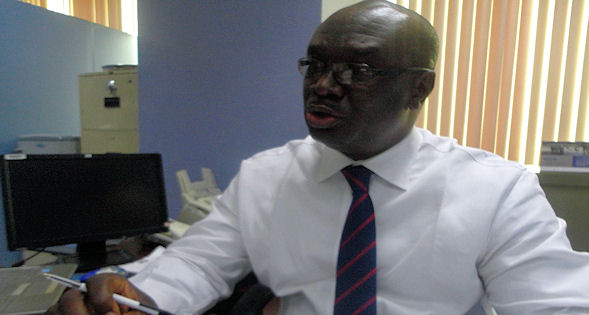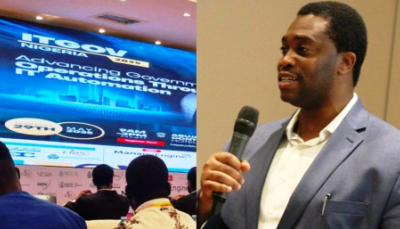Group Head, e-Business at First Bank of Nigeria Plc, Chuma Ezirim, shares with SEGUN ORUAME and MARTIN EKPEKE, IT Edge News, the bank’s plans to raise the stakes for Internet and mobile banking in Nigeria. At over a hundred years of operation, FirstBank has been consistent in sustaining growth and marketplace confidence in Nigeria’s somewhat turbulent financial services sector. Ezirim, whose brief at the bank includes migrating customers from mortar and brick banking to e-banking, says the industry faces surmountable infrastructural challenges as it signs into 21st century banking, and maintains that FirstBank, by virtue of its size and experience, leads the industry in addressing those challenges and bringing new age banking services to increasingly sophisticated customers. He spoke at the bank’s headquarters in Marina, Lagos.
From a FirstBank’s perspective, do you think cashless Nigeria is realistic in 2012?
Cashless Nigeria does not mean a total elimination of cash. It simply means we are trying to reduce the volume of cash that is being used for transactions in Nigeria. The extent to which that can be achieved is something that we can measure, that is why it is called cash -less, there is nowhere in the world where they have achieved zero cash movement. Another thing is that when people asked whether something is possible? Everything is possible in Nigeria. Some years ago, if you had told anybody that a day is coming that one would walk into a bank and within five minutes, he is out of the bank and done with his transactions, nobody would have believed it; or that you don’t need to go to a bank branch to do a transaction, nobody would have believed it. But today, how many people go to the bank to do transactions? In First Bank today, if you opened an account, within 15 minutes your ATM card is ready and customized, and you can start using the card immediately. The point is that reducing the amount of cash in circulation is something that every well meaning Nigerian should support because of the implications of carrying cash around. Armed robbers go to peoples’ homes to rob them of cash, but the question is why do you keep cash at home? Do you know how many people are robbed in bus stops in Lagos because robbers know you will have cash in your wallet? So for us, at the individual level we are looking at safety; for the corporate, we are looking at convenience. Why would I have to carry bundles, when I know I can keep few notes in my wallet and the rest in my bank account and then with my card I can get access to it? The truth is, for the bank we spent so much money managing cash, if I tell you the amount of cash dispense by our ATMs last year, you won’t believe and if I tell you how much it cost us to process each of those notes, you won’t believe. Central Bank spent so much to print those notes.
Banks tend to focus so much on the individual customers. Your concern for me is to spend less cash, but it is not all about me, it is about where I am going to spend that cash. Take for instance, a high profile shopping center in Lagos, recently all the terminals were not working forcing me as a customer to go to one of the ATMs within to get cash before I could make a purchase. Often I think it is not as if Nigerians are not ready to be cashless, it is those transaction points where they are suppose to spend their money that are the problem. When terminals don’t work, cash has to be spent. I don’t see banks targeting those problem areas.
You are right. We are looking at the risks, convenient and the cost of managing cash. You have asked a very pertinent question, are we ready? I will say we are ready in terms of infrastructure; there will be challenges which can be surmounted. In a city like Lagos with 18 million peoples, I am not sure we have up to 3000 active terminals which is quite small. Central Bank has come up with a policy and we are at the point of where we must address those challenges. So they are encouraging banks to massively deploy these terminals, and they are also working with the telcos to come up with a very good network that allows point of sales terminal to convey transactions. These are infrastructural issues which the industry is addressing. What we have also done is to engage the telcos, two of them have given us dedicated channels now.
So most of the terminals you are seeing are old terminals deployed on the old platforms, they are being migrated to new platforms where if you go and do a transaction for instance, instead of going through the normal gateway, it will go through its own gateway dedicated for point of sales services. We also know that these terminals are powered, and CBN has also come up with a policy that for every terminal, they must have a backup battery which will make it work for a minimum of 24 hours. We also have a social problem whereby you go to a terminal, instead of the shop attendant allowing you to use the terminal, they will prefer you use cash because if you pay with cash you might likely leave some change which later becomes their own, but if it is with card, it will pay you to the nearest kobo. So even if the terminal is working, they will pretend that it is not working because he or she wants you to pay with cash – that is a social problem. So by the time we start charging, a shop owner will be more interested to know whether a terminal is working or not, a shop attendant will not be able to go and collect cash and then you are charge for the terminals. So based on what we have done in the past, I will say the industry is ready for the cashless economy. Central Bank has said instead of January 1, let’s move it to April 1 so that all these little problems can be addressed, if by these time in March, we still have not addressed some of these problem, then I can tell you that there is a problem, and as an industry we will go back to the CBN. As of today if you go to the Lagos wharf, you will see thousands of POS terminals that still need to be cleared, we have so many request from our customers now for POS terminals and we are deploying massively, just yesterday we deployed about 400 for Lagos, I am also sure that by the end of this month, most of those places you have gone to where they don’t have POS terminals, you will see
terminals.
FirstBank has a long history of integrating technology into it services; you have Century I, Century II. I know there must be clear cut goals for your e-business channels in termS of the XYZ percentage of customers you plan to migrate to e- transactions to reduce the degree of dependency on cash. What figure are you looking at before year end?
I don’t know of others banks, but in FirstBank our major strength as a bank is we have an executive management that understands e-transactions business and is investing in different channels to drive business in terms of quality of service delivery. So for us over the years, the Bank has consistently taken steps to address some of the challenges we had in the past, so as at today, I can say we are almost there in the sense that I am sure you are aware that FirstBank possesses 30% of all transactions on Interswitch network. Today in Nigeria, one out of every three Verve cards is a FirstBank card, so we control 34% of Verve cards. We have deployed the highest number of ATMs in Nigeria, and based on the report we got from Interswitch, we have the highest number of POS in Nigeria, and we have the highest branch network in Nigeria. Internally, we have also seen massive shift from our branches to our channels because of the abilities of our e-channels. Today, we have been able to do 85% migration, meaning 85% of transactions done in FirstBank today that are qualified to be done through electronic means are done through electronic channels. So more of our customers use our e-channels than the branches, if you go to a First Bank branch now, you won’t see many people.
I used to think that FirstBank with all the technology innovations is still very conservative and very comfortable with the good old ways of banking…
The challenges we have as a bank now which we are addressing is getting people like you that still has this perception issue with FirstBank to even try us because if you look at the Interswitch report, the next bank to us is 13% of what we are doing every month. We virtually dominate that segment of banking as it were. So it is more of a perception thing, I will say over the years, things have really improved, if there is one area where we are getting impact on our investment, it is our channels migration rate.
The issue of security is another thing, why should a customer trust what is being done online?
This is also one area that we stand out as a bank. What I am about to tell you now, you can also go and find out if there is any other bank that have achieved any of these. We have invested so much in infrastructure as a bank that we have certification to show including the ISO 27001 which we got. We also have Business Continuity Management Certification BS25999, we have IT Governance certification; these are the three awards in addition to the one we won last year. These are three information security awards, so as a bank, we have invested so much because we know the impact of fraud on the customers’ confidence. Our Internet banking has a second level of verification. We give you a token. Even if somebody gets your passwords, that person will still need access to your token to access your accounts online. All our cards are chip and pin, of course that is the standard in Nigeria now, so the issue of cloning is no longer there. So we understand clearly the importance of transaction security on what we are doing as a bank.
How much impact do you think mobile banking can have on rural Nigerians?
As you are aware, we are one of the banks that the CBN has issued mobile banking licence. We believe that we must leverage on that to get to the under-banked. When you also look at the industry, you will know that FirstBank has the highest spread and is poised to play a major role in our mobile bank services rollout. We are championing what we call Agency Banking which will define the way we do banking today. What we are saying is you don’t necessarily have go to a bank branch to do all your transactions, you can go to a location that is not a bank and be able to deposit and withdraw cash, and those transaction will impact on your account immediately as if they were done in the branch. So for me, I think the mobile service scheme will achieve two things like allowing those that ordinarily do not have banking services to have access to banking services, because with their mobile phone, they will be able to do transactions. Secondly, it will allow FirstBank to get to people without necessarily opening bank branches. Those are the impacts. Once you have been able to achieve that, the question is must you go to a village and build a 500 million naira infrastructure when the total number of account you can open there is five hundred?
‘In FirstBank our major strength as a bank is that we have an executive management that understands e-transactions business
and is investing on different channels to drive business.’
‘FirstBank possesses 30% of all transactions on Interswitch network. Today in Nigeria, one out of every three Verve cards
is a FirstBank card, so we control 34% of Verve cards.’
‘We have deployed the highest number of ATMs in Nigeria, and based on the report we got from Interswitch, we have the
highest number of POS in Nigeria, and we have the highest branch network in Nigeria.’
‘We have been able to do 85% migration, meaning 85% of transactions done in FirstBank today that are qualified to be done
through electronic means are done through electronic channels.’






























